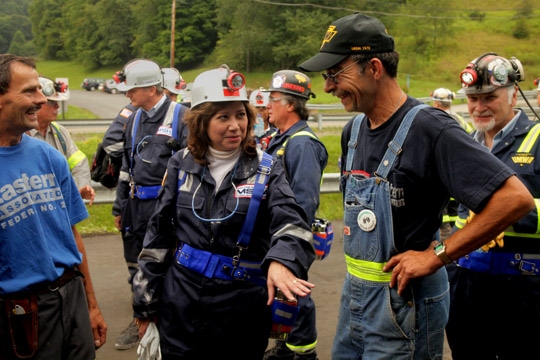
Editor's Note: Cross-posted from the Blog of the U.S. Department of Labor
From the coal that makes it possible for us to power our computers, to the sand and gravel that serves as the foundation of our nation’s infrastructure, we simply could not function as a country without the natural resources that our miners provide.
Mining and extraction industries have been key drivers of rural economic growth during our recovery, creating 80,000 new jobs in the last year alone. Nationally, this sector employs nearly 730,000 people in communities from Appalachia to the American West. For some raised in rural communities where mining is a way of life, this work is part of their family DNA, a profession “handed down” from one generation to the next. For others, a career in the mines is a ticket to a better life for their families. According to our Bureau of Labor Statistics, continuous mining machine operators have an average base pay of $48,000 a year, while supervisors earn more than $70,000.
As a member of President Obama’s Rural Council, I am committed to helping miners get the training they need to harness our natural resources in a safe and cost-effective way. As rising gas prices continue to place strains on middle class families, it’s critical that we support the workers responsible for producing our domestic energy supply.
This commitment starts with maintaining a well-qualified workforce. During the next decade, some 50,000 new workers will have to be trained to replace the mining industry’s aging labor force. Recognizing this challenge, my department has awarded grants to a variety of rural stakeholders to develop training programs tailored to meet the employment needs of local industry.
The projects are as unique as the rural communities that they serve: Penn State University is using special simulators to teach students how to operate sophisticated machinery when down in the mines. Northern Wyoming Community College partnered with Penn State and devised a mobile laboratory to give students on-site training at local coal mines. The Alaska Department of Labor increased mining apprenticeship opportunities and developed a web portal to help Alaskans find jobs in the mining and energy sectors. The College of Eastern Utah offers mining classes to Hispanics and Native Americans in their unique languages. West Virginia University’s Mine Training and Placement Center provides instruction on everything from ventilation techniques to infection control to accident prevention for mineral miners.
But our investment in skills training is only part of our covenant with miners in rural America. The Obama administration is committed to aggressive enforcement of mine safety laws. Our country has a duty to ensure these workers return home to their families each day in the same condition they went to work.
My department’s Mine Safety & Health Administration has rewritten our regulations to toughen worker safety standards, strengthened our enforcement efforts to identify potential hazards, partnered with mining companies to improve emergency response time and rescue capability, and cracked down on operators that cut corners on safety and put workers at risk.
It has been 14 months since the explosion at West Virginia’s Upper Big Branch mine claimed 29 lives. I will never forget traveling to rural West Virginia to stand vigil with the miners’ families in those tense hours when rescue operations were still ongoing. For me, the lesson of the Upper Big Branch tragedy couldn’t be clearer: hazards are to be abated, mines are to be made safe and mine operators are to be held responsible for safety problems they do not fix. We owe nothing less than this strong commitment to the mining families of rural America.



